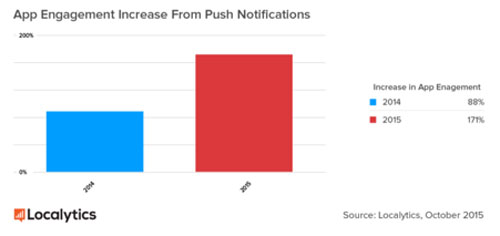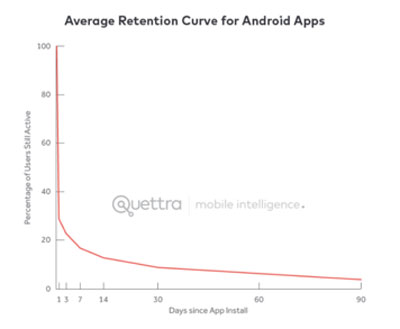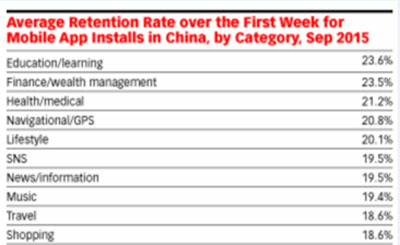The Dangers of Falling in Love with Your Mobile App
Mobile App Growth
November 30, 2018

About the author: Shai Wolkomir is the Co-Founder and CEO of Elasticode.
Entrepreneurs at heart know that in order to make it in the startup world, one must hold real passion for the mission ahead. Making a product you can be proud of, and solving real problems for real people are the biggest motivators out there.
That is absolutely true for the mobile industry as well, where innovative minds change the world, one app at a time.
But while caring deeply about your app is great, it should come with a warning. App developers and marketers are sometimes blinded by their own conviction, and need a fresh point of view in order to see what their product is missing.
The following lines examine the downside of the emotional involvement app publishers develop when working on a mobile app, and what they can do in order to try and avoid them.
Failing to Realize that Your Product Needs Marketing
I have yet to encounter the product, mobile or otherwise, that managed to become a huge success without a solid marketing engine in the background. Sure, in today’s tech arena you can find marketing solutions of all different shapes and sizes (not to mention prices), but the work still needs to be done, no matter how incredible the product may be.
The mobile world has some people confused, however, since it creates a very misleading sense of accessibility. Developers sometimes think that the relatively open platforms offered by the app stores allow them to submit a great app, sit back and watch it skyrocket without any help.
The same way it takes years to become “an overnight success”, it takes strong, smart marketing efforts to make an app a sudden app store hit. The best app still requires a solid push notification strategy, for instance, to keep users coming back for more. We often miss this fact because great marketing is meant to feel natural, but it is always there, whether we like it or not.

A mobile publisher who is too emotionally attached to his or her product, is at risk of making a mistake assuming that after launching the product in the app store, it will magically draw the right crowd and get users to download. In fact, each step calls for specific expertise and tools.
From choosing the right keywords to make your app visible to potential users (using ASO), through creating a compelling app page, with the right video trailer and content – it’s all part of a well-crafted, necessary marketing mechanism.
Unfortunately, many app marketers realize just how important it is to promote their app only after failing to do so in the first place. In this case, once the developer has reached the right conclusion and recognized that the app needs marketing, it’s best to avoid assumptions as much as possible and get outsiders involved.
In other words: it’s best to speak to external experts instead of relying only on the in-house team.
Failing to do Proper Mobile User Onboarding
Studies show that approximately 80 percent of users abandon newly-downloaded apps within the first three days. The statistics in other places around the globe isn’t different, with developers in China having a hard time holding onto users in all categories.
That is due to one little fact: users don’t understand the app’s value and functionality. But if there’s one thing mobile professionals know, it’s that it is never the user’s fault.
It’s not the user who didn’t understand – it’s the app that failed to explain.

Mobile developers and marketers who fall in love with their product see its value so clearly, they find it hard to imagine why anyone else wouldn’t. But as data shows time and time again, plenty of people could use an elaborate explanation, telling them why they should use a mobile product and how to effectively do so.

Mobile user onboarding is the friendly welcome the app could be missing. It is a great way of explaining the product to users, thus minimizing the risk of having them delete the app right away.
First of all, great onboarding includes a value proposition that gives every first time user a little “spoiler”, letting him or her know what they have to gain by using this product.
It’s important that users understand what the app is all about.
Not only that, but value plays a part in convincing users to give an app permission to access their personal data. When users fail to see why a certain app wants to learn more about them – they might suspect that it is an attempt to gather data for the wrong reasons.
Second, the onboarding stage is the perfect opportunity to give users an app tutorial that will walk them, step by step, through the different features the app has to offer, explaining the purpose and usage of each one. Creating a good app tutorial is crucial, since we want to deliver a lot of information on one hand, and avoid creating a burden or exhausting users on the other.
Once again, being too attached to the app sometimes means that the creator himself fails to see what should be left out of the app walkthrough.
Explaining your app to users begins with understanding who he user is and delivering a personalized message within your app. The very essence of mobile means that it is a personal device, and not all users are alike.
That is another risk for developers who are too hung-up on their product, as they might believe that their own experience applies to every single one of their users.
I assure you that it does not.
I highly recommend including a personalized mobile onboarding process whenever the need arises to deliver new information to users. The right mobile onboarding can be used to introduce new features and versions, notify users when they missed a part of the app, and refresh users’ memory if they have returned to the app after a while.
Mobile developers who focus on creating a great customer experience know that communication plays a very important role in the process, and onboarding, is where it all begins.
Failing to Adapt to Changing Circumstances
The mobile platform couldn’t have chosen a more suitable name – it is a fast moving one, and everything changes in a heartbeat. While that is good news for some, it also means a lot of extra work for everyone involved.
Staying agile on mobile is far more difficult than doing so on the web, for example. The challenge of mobile development, including the need to adjust your product to numerous screen sizes and operating systems, is no easy task.
Not easy, but very important.
Every part of the app making process requires continuous monitoring and adjusting: keywords, reviews, devices, programming languages, tools and more. Staying agile in the mobile sphere isn’t a nice to have – it’s a necessity.
That is why assuming that an app is complete (not to mention perfect) is one of the most dangerous things an app publisher can do. A great mobile professional knows that no mobile product is ever truly ready, and is always ready to change and adapt.
Conclusion
Supporting your own product with strong conviction is a wonderful thing, and it will get you through many obstacles in the startup way of life. But there is a fine line between having faith in your product and thinking that it’s perfect.
Someone on your team has to play the devil’s advocate and raise a few painful questions:
- What happens if the user is not at all on the same page as you?
- How do you deliver the message to those who need your product, but don’t know it yet?
Your app could help users solve a certain problem, but that doesn’t mean you know what goes through the user’s mind. Getting a different perspective and embracing the need for change could be what your app is missing, and what will help it become truly great.
***
More about the author: Shai Wolkomir is the Co-Founder and CEO of Elasticode, a Techstars company helping mobile app owners create and deliver personalized mobile user onboarding experiences. Elasticode’s mobile onboarding platform enables app publishers to iterate faster and customize their product to user’s needs with real-time personalization.
- Engage, Retain, Earn: Growth Strategy for Game Apps [Based on Data] - 15 September 2022
- How to do App Store Optimization step-by-step: a full cycle of ASO in the App Store and Google Play - 9 August 2022
- The Importance of A/B Testing - 13 January 2022


The article is one of the best I must say. The way Shai explained the issue and introduced the marketing essentially. The food delivery apps in India on the other hand are on some another level. You can get to know that here.